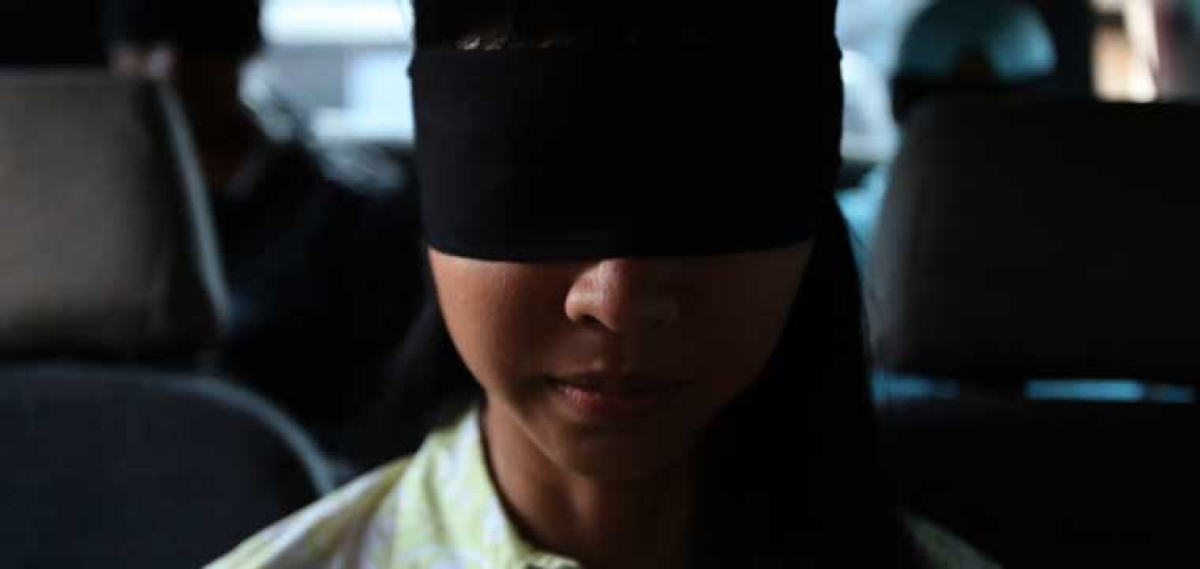
Screening Religion: "Mata tertutup (The Blindfold)" by Garin Nugroho
The film is built around three loosely interwoven stories of young people who fall prey to a banned extremist Islamic sect called Negara Islam Indonesia (NII). The stories attempt to come at the phenomenon from different perspectives of wealth, age and gender, showing that this is a problem that crosses all these primary social distinctions, and hence has a salience for all major social groups.
Lower class Jabir is a young man who can’t afford to stay in school and drifts into NII for the simple solutions it offers to his most obvious problems. Asimah, a relatively wealthy matriarch, searches for her daughter, who we surmise, has turned to Islam for an escape from maternal domination. Rima, an ambitious young middle class girl, buys into the NII’s claims that it offers a way of remaking society that will be more inclusive of women. Various motifs, such as maternal influence, link the stories. Jabir is led into extremism by concern for his mother who must work at menial jobs to support her deadbeat partner as well as her son’s studies. Women’s self-sacrifice is an accepted part of lower class life, and the logic of Jabir’s actions in becoming a suicide bomber is to embrace his own form of self-sacrifice in the most literal of ways (and religious extremism is nothing if not literal in its visions of damnation and salvation.) He is persuaded by the offer of syafaat – a fast-track ticket to paradise – for his mother. If Jabir’s story tells of maternal relations from the point-of-view of the child, the story of Asimah and her daughter reverses this, making the child a barely glimpsed presence. The mother is considerably higher on the social scale, a small entrepreneur who dominates all those around her. Her husband is long gone and her employees defer to her, with a mixture of affection and resentment, as a mouthy matriarch. Insecurity typically forces her to assert herself verbally. In one scene she falls asleep on a bus, and on waking at the end of the line, immediately launches into an attack on an unseen bus driver as a reflex response.
The theme of women’s vulnerability in a patriarchal society is taken up by Rima’s story. She is a smart young woman and her family is rather intimidated by this. Asked to question her about her activities, her father can merely offer her an envelope of cash as a way of assuring her of his affection. The exchange rate between happiness and the rupiah is one that religious fanatics understand only too well, and Rima’s fundraising efforts gain her the admiration of NII’s leaders. But their admiration will only take her so far in an organisation built on the hypocrisy of those who denounce corruption while grasping for money, and who offer hope to women while treating them with implicit contempt.
Within the context of Indonesian cinema and Indonesian society, it is significant to see a stand being taken against radical fundamentalism. The Blindfold was produced with the assistance of a moderate Islamic organisation, the Maarif Institute. The irredeemable sin of the NII extremists is to attack the state. They seize on the way that, in the new democratic environment, everyone has the luxury of grumbling about the government as the source of all forms of discontent. A woman who gets dropped off at the wrong bus stop has her outrage whipped up by covert recruiters, who turn her personal distress into a broader social one through the idea that women aren’t safe on the streets anymore. They sell people spurious solutions to personal problems as well as political ones. An insecure young man is fed the proposition that buying a promotion within the NII will make him more forceful and confident.
It is an urgent film in addressing a pressing social issue within the society from which it came. It is also a film of remarkable stylistic sureness and variety. Its triumph is to show that these things are by no means mutually exclusive.
Date: 14 August, 7-9 p.m.
Venue: Café Alibi (Beethovenstraße 6)


